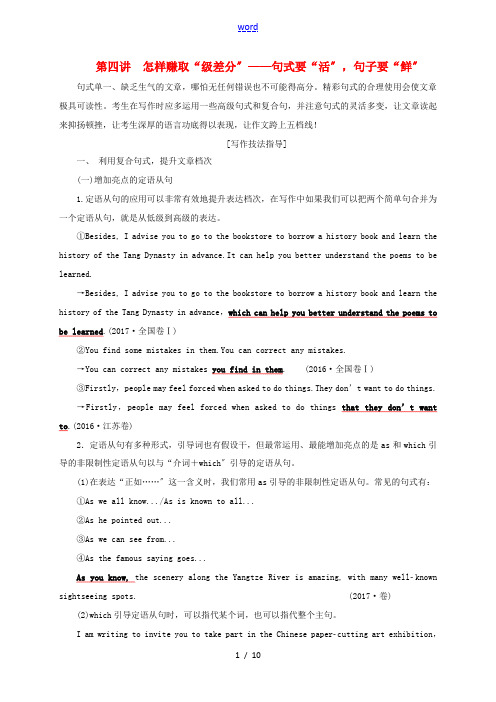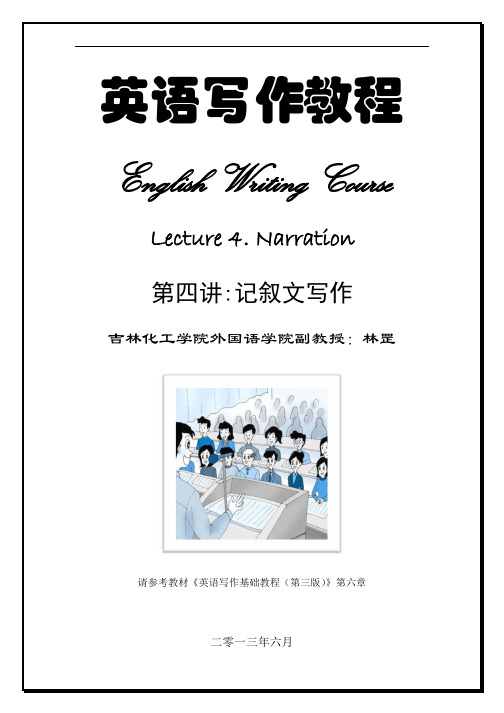英语写作教程第四讲
高三英语二轮复习 专题六 书面表达 第四讲 怎样赚取“级差分”-句式要“活”,句子要“鲜”练习-人教

第四讲怎样赚取“级差分〞——句式要“活〞,句子要“鲜〞句式单一、缺乏生气的文章,哪怕无任何错误也不可能得高分。
精彩句式的合理使用会使文章极具可读性。
考生在写作时应多运用一些高级句式和复合句,并注意句式的灵活多变,让文章读起来抑扬顿挫,让考生深厚的语言功底得以表现,让作文跨上五档线![写作技法指导]一、利用复合句式,提升文章档次(一)增加亮点的定语从句1.定语从句的应用可以非常有效地提升表达档次,在写作中如果我们可以把两个简单句合并为一个定语从句,就是从低级到高级的表达。
①Besides, I advise you to go to the bookstore to borrow a history book and learn the history of the Tang Dynasty in advance.It can help you better understand the poems to be learned.→Besides, I advise you to go to the bookstore to borrow a history book and learn the history of the Tang Dynasty in advance,which can help you better understand the poems to be learned.(2017·全国卷Ⅰ)②You find some mistakes in them.You can correct any mistakes.→You can correct any mistakes you find in them. (2016·全国卷Ⅰ)③Firstly,people may feel forced when asked to do things.They don’t want to do things.→Firstly,people may feel forced when asked to do things that they don’t want to.(2016·江苏卷)2.定语从句有多种形式,引导词也有假设干,但最常运用、最能增加亮点的是as和which引导的非限制性定语从句以与“介词+which〞引导的定语从句。
实用阶梯英语写作教程课件unit 4 Listing and Exemplification

Everything seemed
I tore a hole on the bathing suit; to go wrong with
4 Friends thought I would dive me at the swimming
when I just wanted to see view pool.
Warm-up Activity: Setting your goals
• 1. List what you will do to achieve your goal.
• 2. Interview one of your friends about his/her goal and the actions they will take.
as an illustration
• to illustrate
as an example
• take…for example
consider…for example
• as follows
in other words
• let me cite as proof
• according to statistics (statistical evidence)
• 1. Learning English is a rewarding experience. • 2. How higher education has affected my life. • 3. Making mistakes is a good way to learn. • 4. There is a lot to learn outside the classroom.
• Pass CET4, • Improve English skills, • Get scholarship, • Join some student organizations, like student
第四讲 现象解释性议论文写作

表明个人态度 或阐述个人做 法 表明个人态度 或阐述个人做 法
表明个人态度 或阐述个人做 法 得出结论或表 明个人看法或 做法
2010年6月四级作文题
Due Attention Should Be Given To Spelling
1. 如今不少学生在英语学习中不重视拼写; 2பைடு நூலகம் 出现这种现象的原因是… 3. 为了改变这种状况,我认为….
In view of the importance of the issue, I firmly argue that effective measures should be taken to make students attach great importance to word-spelling. For one thing, exams should be modified to add some factors into it, which would help students pay more attention to spelling. For another, schools should also set effective mechanisms to help teachers as well as the students to realize the importance.
此类文章的基本写作方法为:描述现象→分析原因→对 现象做出预测或如何促进(限制)这种现象的进一步发展。
题型
现象解释型 对比选择型
问题解决型 观点论证型
第一段 第二段 第三段
描述现象
表明一方或双 方的观点及理 由
提出问题
提出论点
说明现象产生 的原因
表明另一方的 观点及理由, 指出双方观点 不足之处及理 由 分析问题,给 出解决方案
大学英语写作课程Unit Four Sentence Base

Voice
Once a subject is chosen, the next step is to decide the voice. When should we use the passive or active voice? What are their distinctive features?
A treacherous fellow is the Shark. He never makes the least remark. -- Alfred Douglas, "The Shark“ To emphasize "a treacherous fellow" and to achieve the rhyme
Part II Focus
Subject • We should be aware of nominalization and use of abstract nouns as subjects and try to use them cautiously. • Learn to use human and specific nouns as subjects.
• In the center of the painting stands a lady in white.
• A lady in white stands in the center of the painting.
Classroom activities on P.46
1. 1). Rod missed the fun of college by making chemistry his sole activity and participating in no other extracurricular activities. • 2). Cayenne is used freely by Mexican cooks because it adds spice to their sauces and provides color as well.
英语写作教程第四讲

英语写作教程 English Writing Course Lecture 4. Narration第四讲:记叙文写作吉林化工学院外国语学院副教授:林罡请参考教材《英语写作基础教程(第三版)》第六章二零一三年六月Lecture 4 Narration (1)Prewriting: Free Writing (1)Activity: Freewriting about a memorable event or experience in your life (2)Part I. Organisation: Narration – Time Order (4)Time order words and phrases (5)Writing Practice One. Time Order Words (6)Writing Practice Two. Time Order Paragraph (8)Part II. Grammar and Mechanics – Simple Present Tense and Adverbs of Frequency (9)Simple Present Tenses (11)Position of Adverbs of Frequency (11)Practice 1: Simple Present Tense and Adverb Frequency (12)Comma Rules (15)Practice 2: Punctuation – comma rules (16)Writing Task 1: A Traditional Wedding (17)Part III. Sentence Structure: Compound Sentences (18)Questions on the model (19)Compound Sentences (19)Practice 3. Compound Sentences: with, and, or, but, so (20)Writing Task 2. Sentence Combining (22)Part IV The Writing Portfolio (24)STEP 1. Prewrite to get ideas (24)STEP 2. Organize the ideas (24)STEP 3. Write the Rough Draft. (24)STEP 4. Edit the Rough Draft (25)STEP 5. Write the Second Draft (26)STEP 6. Write the Final Draft. (26)Part V. Vocabulary to Enhance your Writing (26)Lecture 4 NarrationIn this lecture, you will concentrate on writing narration, a kind of writing in which you report events. In the first part of the lecture, you will write about an event or experience that happened to you in the past. In the second part, you will write about the traditional events of a wedding.Prewriting: Free WritingFreewriting is a way first to get and then to develop ideas. When you freewrite, you write “freely” – without stopping – on a topic for a specific amount of time. You just write down sentences as you think of them without worrying about whether your sentences are correct or not. Y ou also don’t have to punctuate sentences or capitalize words. Y ou can even write incomplete sentences or phrases. The main goal in freewriting is to keep your pencil moving across the paper.Now look at this student’s example of freewriting on the topic “A Memorable Even in my life”The student freewrote until he found a good topic: the earthquake. If he had wanted to, he could have done further freewriting about his earthquake experience to develop this topic.Activity: Freewriting about a memorable event or experience in yourlifeNow you try it. Freewrite about a memorable event or experience in your life. This might be a happy day, a sad event, an embarrassing moment, an interesting trip, or a frightening experience. Write for about ten minutes without stopping. If you find a topic during your freewriting, continue freewriting on that topic. If you already have a topic in mind before you start, freewrite on that topic for ten minutes to develop your ideas about it.Save your freewriting. You will use it later to write a paragraph in Part IV.Questions on the model1.How many time divisions are in the model essay? What are they?2.How many paragraphs are in the model essay? What time words or phrases begineach paragraph? Circle them.Part I. Organisation: Narration – Time OrderNarration is story writing. When you write a narrative paragraph or essay, you write about events in the order that they happened. In other words, you use time order to organize your sentences.In the model essay, the writer used time order to divide the essay into paragraphs. First, he wrote about what he and his family were doing just before the earthquake. Then he wrote about what happened during the earthquake. Next he wrote about what they did immediately after the earthquake. In the fourth paragraph, he wrote about his parents’ arrival home two hours later.An outline of the essay would look like this:I.Introduction: before the earthquakeII.Bodya)During the earthquakeb)After the earthquakec)Two hours after the earthquakeIII.ConclusionTime order words and phrasesTime order words and phrases are usually followed by a comma if they come at the beginning of a sentence. Then and now are usually not followed by a comma.Study the model essay, draw a circle around all of the time order words and phrases you find, and add any new ones to the list on the form above.Writing Practice One. Time Order WordsWriting Practice Two. Time Order ParagraphWrite the sentences from the proceding exercise as single paragraph. Try to make your paragraphs flow smoothly by using these three techniques:(1)Add time order words or phrases at the beginning of some of the sentences(2)Combine some of the sentences to form simple sentences with compound verbs(3)Change nouns to pronouns where possible.Part II. Grammar and Mechanics – Simple Present Tense and Adverbs of FrequencyAs you read the model essay, notice the verb tenses:Simple Present TensesPosition of Adverbs of FrequencyPractice 1: Simple Present Tense and Adverb FrequencyB. Choose a classmate from a different region from your own and ask each other questions about traditional weddings in your regions. Ask the following questions and other questions of your own. Use the simple present tense and different adverbs of frequency in your answers.1. When do wedding often take place in your region (eg. He Nan Province)?2. Do weddings usually take place in the morning?3. Do they ever take place at night?4. Where do they usually take place? Do they ever take place anywhere else?5. What colour id the bride’s dress? Is it always that colour?6. What else does the bride traditionally wear?7. What does the groom wear?8. Who sometimes cries at the wedding? Who rarely cries?9. Is there a party after the wedding?10. Where is the party usually held?11. What happens at the party?12. What kind of food and drinks are served?13. Are weddings expensive in your area?14. Who pays for wedding in your area?15. Do the couple often or seldom pay for their own wedding?Any other related questions are accepted.Comma RulesPractice 2: Punctuation – comma rulesWriting Task 1: A Traditional WeddingUse the answers of Practice 1-B, and write two paragraphs telling about a traditional wedding in a classmate’s region.Part III. Sentence Structure: Compound SentencesThe model for this section is a folktale. A folktale is a traditional story that had been passed down orally from one generation to the next until someone finally wrote it down. Every culture is rich in folktales. This one is from France.Questions on the model1.What kind of order does this folktale use?2.Underline the time words and phrases in the narration and add any new ones toyour list.Compound SentencesPractice 3. Compound Sentences: with, and, or, but, soA.Draw a circle around all of the coordinating conjunctions in the story aboutMonsieur Seguin’s Goat. Explain why some of them have commas, but others don’t.B.Decide which of the following are compound sentences and which are simplesentences. Write CS or SS in the space at the left. Then add commas to the compound sentences.Writing Task 2. Sentence CombiningPart IV The Writing PortfolioNow let’s complete the writing process you began at the beginning of this lecture. Write a composition of one or more paragraphs about a memorable event or a memorable experience in your life. Follow these steps to write a good composition.STEP 1. Prewrite to get ideasThis was the freewriting you did at the beginning of this Lecture.STEP 2. Organize the ideasPut the events into time order: make a list of the vents or number them on your freewriting paper. Use this list to guide you as you writeMake a list of ideas in the order that you will write about them. You will use this list to guide you as you write.STEP 3. Write the Rough Draft.Write SECOND DRAFT at the top of your WWJ (Weekly Writing Journal). Write the second draft of your composition. Then ask your partner to proofreading.STEP 6. Write the Final Draft.After your partner returns your composition, write a neat final copy to hand in for final evaluation. Write Final Draft at the top of your paper.Part V. Vocabulary to Enhance your WritingAid with your English-English dictionary to study the following pairs of words, and then write out the difference.1.normal – ordinaryI’m not looking for anything fancy, just a normal kettle.I’m just an ordinary person.2.Skin – complexionI got so sunburnt that my skin that my skin is peeling.Drinking a lot of water is good for the complexion.3.noticed – remarkedI’ve noticed that there are more butterflies this year.“You’re looking very well!” she remarked.4.office – studyReuters is a big agency with offices all over the world.I’ll have a bigger study in my new apartment.5.game – toyLet’s play a game of hide-and-seek.Alice got a new toy for her birthday.ck – needHis real problem is that he lacks confidence.We need an hour to get to the airport.7.wet – dampDon’t sit on that bench. The paint is still wet.You shouldn’t wear that shirt if it’s still damp. ANSWERS FOR LAST WEEK’S VOCABULARY STUDIES29。
部编版2020高考英语 第三部分 写作层级训练 第二步第四讲 以“纲”悟“意”,洞察提纲类写作(讲解)

第四讲以“纲”悟“意”,洞察提纲类写作李仕才一、题型特点提纲作文要求考生根据所给出的提示性文字,首先确定文章的中心思想,然后紧紧围绕中心思想展开论述,表达主旨。
它的特点是提纲既体现了文章的层次,又规定了各段大致的内容,为考生提供了写作思路。
二、写作技巧1.仔细研读题目。
做到三定:定体裁,定人称,定时态。
2.分析整合要点。
对所给的要点进行分析及重新整合,并适当进行细节扩展。
3.斟酌具体表达。
结合文章要点及关键词确定选用的具体词汇及句式。
【典例示范】 (江苏卷)生活中冲突时有发生。
假设你班同学苏华和李江打篮球时发生争执,导致关系紧张,请你结合此事,并根据以下提示,用英语写一篇短文,向学校英文报” Happy Teens”专栏投稿。
注意:1.对所有要点逐一陈述,适当发挥,不要简单翻译。
2.词数150左右。
开头已经写好,不计入总词数。
3.作文中不得提及有关考生个人身份的任何信息,如校名、人名等。
[参考范文]Conflicts with others are common in everyday life. During the basketball game yesterday afternoon, Su Hua and Li Jiang bumped into each other, trying to catch the ball. Then they started shouting and yelling, and it turned into a horrible quarrel.To be honest, it was Su’s fault but Li was also to blame—they were not calm enough and both said some really mean things. They cared too much about winning and losing. As a matter of fact, blocking, pushing and bumping are just part of a tough game.To avoid such conflicts, we should be kind to one another, which is essential to enjoying a harmonious life. It is also a virtue to forgive and forget, especially in such a competitive and stressful society. Instead of blaming each other, we should communicate more and put o urselves in others’ place.Don’t be self-centered and try to be considerate. We must learn to handle conflicts calmly and wisely.能力提升练1(2018·常州一中质检)假如你是新华中学的学生李华,偶然看到在你市求学的美国学生Tom 在网上发帖,要大家给他推荐一本学习汉语的书。
适用于新教材2024版高考英语总复习写作专项提升:活动报道人物介绍北师大版

My Weekend Organized by the student union,my classmates and I went to the Sunshine Farm to help the farmers pick peaches last weekend.Located at the foot of a mountain where there are a variety of fruit trees,peach trees in particular,the farm is impressive. On arriving there,we were thrilled to see ripe peaches hanging on trees.Led by the workers and using baskets and ladders,we first picked the most beautiful ones in color,which were ripe and soft.I couldn’t wait to take a bite,and the sweet juice went down. Tired as I was,I felt very delighted.Not only did I get a golden opportunity to get close to nature,but I also experienced the joy of labor.
二、人物介绍 1.文体结构
大学英语高级写作教程Unit 4 Argumentative Writing

2. What is a hot social issue or problem that concerns you and other students you know? Economic advancement Vs environment protection? • Who are to blame for current environmental damage? • The growing CPI? • Should government intervene to save the market? • Talk about this issue or problem and discuss its influence. • What are people doing about this issue or problem? • What is your opinion and why?
• • • •
2. Identify and evaluate the support a writer provides to defend an argument Read the magazine article in the textbook “College Lectures: Is Anybody Listening?”, which will give you a general idea of argumentative writing. In it, David Daniels questions a traditional teaching method: the lecture class. Before you read, answer these questions: Have you attended any lecture classes in college? If so, what happened in them? Is lecturing an effective way for you to learn? Do you think your experience in lecture classes is typical? Why might some object to lecturing as a teaching method? Why might some defend it?
- 1、下载文档前请自行甄别文档内容的完整性,平台不提供额外的编辑、内容补充、找答案等附加服务。
- 2、"仅部分预览"的文档,不可在线预览部分如存在完整性等问题,可反馈申请退款(可完整预览的文档不适用该条件!)。
- 3、如文档侵犯您的权益,请联系客服反馈,我们会尽快为您处理(人工客服工作时间:9:00-18:30)。
英语写作教程 English Writing Course Lecture 4. Narration第四讲:记叙文写作吉林化工学院外国语学院副教授:林罡请参考教材《英语写作基础教程(第三版)》第六章二零一三年六月Lecture 4 Narration (1)Prewriting: Free Writing (1)Activity: Freewriting about a memorable event or experience in your life (2)Part I. Organisation: Narration – Time Order (4)Time order words and phrases (5)Writing Practice One. Time Order Words (6)Writing Practice Two. Time Order Paragraph (8)Part II. Grammar and Mechanics – Simple Present Tense and Adverbs of Frequency (9)Simple Present Tenses (11)Position of Adverbs of Frequency (11)Practice 1: Simple Present Tense and Adverb Frequency (12)Comma Rules (15)Practice 2: Punctuation – comma rules (16)Writing Task 1: A Traditional Wedding (17)Part III. Sentence Structure: Compound Sentences (18)Questions on the model (19)Compound Sentences (19)Practice 3. Compound Sentences: with, and, or, but, so (20)Writing Task 2. Sentence Combining (22)Part IV The Writing Portfolio (24)STEP 1. Prewrite to get ideas (24)STEP 2. Organize the ideas (24)STEP 3. Write the Rough Draft. (24)STEP 4. Edit the Rough Draft (25)STEP 5. Write the Second Draft (26)STEP 6. Write the Final Draft. (26)Part V. Vocabulary to Enhance your Writing (26)Lecture 4 NarrationIn this lecture, you will concentrate on writing narration, a kind of writing in which you report events. In the first part of the lecture, you will write about an event or experience that happened to you in the past. In the second part, you will write about the traditional events of a wedding.Prewriting: Free WritingFreewriting is a way first to get and then to develop ideas. When you freewrite, you write “freely” – without stopping – on a topic for a specific amount of time. You just write down sentences as you think of them without worrying about whether your sentences are correct or not. Y ou also don’t have to punctuate sentences or capitalize words. Y ou can even write incomplete sentences or phrases. The main goal in freewriting is to keep your pencil moving across the paper.Now look at this student’s example of freewriting on the topic “A Memorable Even in my life”The student freewrote until he found a good topic: the earthquake. If he had wanted to, he could have done further freewriting about his earthquake experience to develop this topic.Activity: Freewriting about a memorable event or experience in yourlifeNow you try it. Freewrite about a memorable event or experience in your life. This might be a happy day, a sad event, an embarrassing moment, an interesting trip, or a frightening experience. Write for about ten minutes without stopping. If you find a topic during your freewriting, continue freewriting on that topic. If you already have a topic in mind before you start, freewrite on that topic for ten minutes to develop your ideas about it.Save your freewriting. You will use it later to write a paragraph in Part IV.Questions on the model1.How many time divisions are in the model essay? What are they?2.How many paragraphs are in the model essay? What time words or phrases begineach paragraph? Circle them.Part I. Organisation: Narration – Time OrderNarration is story writing. When you write a narrative paragraph or essay, you write about events in the order that they happened. In other words, you use time order to organize your sentences.In the model essay, the writer used time order to divide the essay into paragraphs. First, he wrote about what he and his family were doing just before the earthquake. Then he wrote about what happened during the earthquake. Next he wrote about what they did immediately after the earthquake. In the fourth paragraph, he wrote about his parents’ arrival home two hours later.An outline of the essay would look like this:I.Introduction: before the earthquakeII.Bodya)During the earthquakeb)After the earthquakec)Two hours after the earthquakeIII.ConclusionTime order words and phrasesTime order words and phrases are usually followed by a comma if they come at the beginning of a sentence. Then and now are usually not followed by a comma.Study the model essay, draw a circle around all of the time order words and phrases you find, and add any new ones to the list on the form above.Writing Practice One. Time Order WordsWriting Practice Two. Time Order ParagraphWrite the sentences from the proceding exercise as single paragraph. Try to make your paragraphs flow smoothly by using these three techniques:(1)Add time order words or phrases at the beginning of some of the sentences(2)Combine some of the sentences to form simple sentences with compound verbs(3)Change nouns to pronouns where possible.Part II. Grammar and Mechanics – Simple Present Tense and Adverbs of FrequencyAs you read the model essay, notice the verb tenses:Simple Present TensesPosition of Adverbs of FrequencyPractice 1: Simple Present Tense and Adverb FrequencyB. Choose a classmate from a different region from your own and ask each other questions about traditional weddings in your regions. Ask the following questions and other questions of your own. Use the simple present tense and different adverbs of frequency in your answers.1. When do wedding often take place in your region (eg. He Nan Province)?2. Do weddings usually take place in the morning?3. Do they ever take place at night?4. Where do they usually take place? Do they ever take place anywhere else?5. What colour id the bride’s dress? Is it always that colour?6. What else does the bride traditionally wear?7. What does the groom wear?8. Who sometimes cries at the wedding? Who rarely cries?9. Is there a party after the wedding?10. Where is the party usually held?11. What happens at the party?12. What kind of food and drinks are served?13. Are weddings expensive in your area?14. Who pays for wedding in your area?15. Do the couple often or seldom pay for their own wedding?Any other related questions are accepted.Comma RulesPractice 2: Punctuation – comma rulesWriting Task 1: A Traditional WeddingUse the answers of Practice 1-B, and write two paragraphs telling about a traditional wedding in a classmate’s region.Part III. Sentence Structure: Compound SentencesThe model for this section is a folktale. A folktale is a traditional story that had been passed down orally from one generation to the next until someone finally wrote it down. Every culture is rich in folktales. This one is from France.Questions on the model1.What kind of order does this folktale use?2.Underline the time words and phrases in the narration and add any new ones toyour list.Compound SentencesPractice 3. Compound Sentences: with, and, or, but, soA.Draw a circle around all of the coordinating conjunctions in the story aboutMonsieur Seguin’s Goat. Explain why some of them have commas, but others don’t.B.Decide which of the following are compound sentences and which are simplesentences. Write CS or SS in the space at the left. Then add commas to the compound sentences.Writing Task 2. Sentence CombiningPart IV The Writing PortfolioNow let’s complete the writing process you began at the beginning of this lecture. Write a composition of one or more paragraphs about a memorable event or a memorable experience in your life. Follow these steps to write a good composition.STEP 1. Prewrite to get ideasThis was the freewriting you did at the beginning of this Lecture.STEP 2. Organize the ideasPut the events into time order: make a list of the vents or number them on your freewriting paper. Use this list to guide you as you writeMake a list of ideas in the order that you will write about them. You will use this list to guide you as you write.STEP 3. Write the Rough Draft.Write SECOND DRAFT at the top of your WWJ (Weekly Writing Journal). Write the second draft of your composition. Then ask your partner to proofreading.STEP 6. Write the Final Draft.After your partner returns your composition, write a neat final copy to hand in for final evaluation. Write Final Draft at the top of your paper.Part V. Vocabulary to Enhance your WritingAid with your English-English dictionary to study the following pairs of words, and then write out the difference.1.normal – ordinaryI’m not looking for anything fancy, just a normal kettle.I’m just an ordinary person.2.Skin – complexionI got so sunburnt that my skin that my skin is peeling.Drinking a lot of water is good for the complexion.3.noticed – remarkedI’ve noticed that there are more butterflies this year.“You’re looking very well!” she remarked.4.office – studyReuters is a big agency with offices all over the world.I’ll have a bigger study in my new apartment.5.game – toyLet’s play a game of hide-and-seek.Alice got a new toy for her birthday.ck – needHis real problem is that he lacks confidence.We need an hour to get to the airport.7.wet – dampDon’t sit on that bench. The paint is still wet.You shouldn’t wear that shirt if it’s still damp. ANSWERS FOR LAST WEEK’S VOCABULARY STUDIES29。
